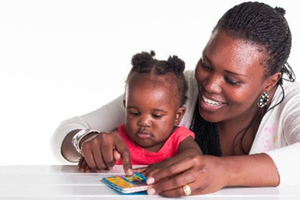The big talk: How to handle your child's sex and reproduction questions

It is important that you discuss human sexuality with your child as soon as he or she begins to ask about it.
What you need to know:
- Do not lecture your child or stop them when they begin to open up.
- It is important that you discuss human sexuality with your child as soon as she or he begins to ask about it.
- Bear in mind that your child already has a view on human sexuality, which may not be far from the truth.
Eva Gichuki realised that her daughter was becoming sexually aware from the way she inquisitively watched love scenes in movies and soap operas. "Whenever a couple began kissing or appeared to get intimate, she would throw curious glances at me as though she wanted to ask about it," says the 31-year-old mother of two. Eventually, her daughter popped the big question. "Mummy," she posed, "where do babies come from?"
Eva admits that though she was anticipating questions on sexuality from her daughter, she was not ready to answer them.
"I was startled at first and pretended that I'd not heard the question correctly," she says. Eva gave her daughter the legendary sexuality fib: "Babies come with airplanes and mummies go to get them at the hospital!"
"My four-year-old son became concerned when we decided to move him out of our bedroom. In the first few weeks, he kept asking why he couldn't stay with us anymore," says Charity Karimi. To calm him, Charity assured him that he was now a big boy who was old enough to have his own room just like other big boys.
Catherine Atieno, on the other hand, was caught unawares when her daughter, straight out of the blue, asked her why she didn't have a tail between her legs like their neighbour's son. "It was not a question that I'd expect to hear from her," she says. She explained to her that it was because she was a girl and girls don't have 'tails' like boys.
Parental concerns
In most cases, questions on human sexuality from kids go unanswered and conversations about sexuality are also considered taboo in many local communities.
According to Zipporah Nderitu, a child psychologist based in Nairobi, it is important that you discuss human sexuality with your child as soon as she or he begins to ask about it. "Children will be aware and able to comprehend issues relating to their bodies and human sexuality in general from around the age of four," she says.
Zipporah says that by avoiding the discussion, you may be silently communicating to your child that you are unavailable. Consequently, she may hesitate to share with you any disturbing sexuality issues such as if she is abused. In other cases, she may learn about sexuality from her friends, the media, and the internet.
Discussion and solution
“It's not that I don't want to talk to my children about sexuality, I just don't want to divulge too much information or get too vague that the whole idea gets lost on them," says Eva.
To begin with, it is important that you find the right time or moment. For instance, do not call your child randomly and decide it is time for the big talk. Rather, allow the discussion to arise naturally. You will need to first determine how much your child knows and what she is able to understand. For instance, during a movie scene, your child may ask you if the couple that just hugged is going to have sex.
Priscilla Chepkorir says that by determining how much her ten-year-old daughter knew about sexuality, she was able to know her level of understanding on the subject. "In one of our evening discussions, she quipped that a certain couple was going to have sex. I asked why she thought so, and she replied that it was because they loved each other." However, the daughter could not fully see the connection between consent, age, sex, and pregnancy, or the disconnection between sex and love. "I was able to move in fast and correct the perception," she says.
According to Zipporah, sexuality discussion should be open-ended. "Do not lecture your child or stop them when they begin to open up. That way, you will be able to not only listen to the child but also give answers correctly and openly," she says. When you find that you are not prepared to answer or discuss, let your child know you need time to think it through. This way, she will know that her question has weight and has been taken seriously.
What to do
Keep discussing: Children have a short memory span and may forget things fast. Make it a point to hold the discussion often. You will know what she knows and be able to correct misconceptions.
Biological changes: Explain her biological changes when she comes of age. Remember to include the possible repercussions of a reckless sexual lifestyle.
Sex and protection: If your older child has a boyfriend or girlfriend, wisely get down to the specifics. Find out if they are sexually active. If they are, be careful to talk about condoms and contraception, even as you discourage them from having premature sex.
Sex and love: Help your child understand that sex does not necessarily amount to love or forge a permanent, healthy relationship. Neither does sex always entail respect, love, and care.
What not to do:
Don't lie: Bear in mind that your child already has a view on human sexuality, which may not be far from the truth. Therefore, do not lie or give her a half-truth. From the start, be a reliable source of information for her, that way, she will always rely on you even when outside influence comes her way.
Don't explain heavily: Your child may not be interested or keen on knowing the details. If she asks 'why are they holding hands?' a simple answer like, 'because they like each other' may be all she wants to hear – unless she asks further questions.
Don't take it lightly: There's a reason why your child wants to know. It could be that she saw a graphic sexual scene, or someone asked her to have sex or even an abuser accosted her, and she chose to ask you what [sex] is.
Discussion by age
4-6 years - Let her know that strictly, her private parts should not be fondled by anyone else. Explain that babies are made by mummy and daddy, and are born by mummy at the hospital.
6-11 years - Explain that only people who are old and married should have sex. Let her know that she shouldn't have sex with anyone because little girls should not have sex while they are young and still in school. Explain what rape and child sexual abuse is. Show her ways of protecting herself from these.
12-Adolescence - Explain why sex is important in a good relationship and its connection to love and stability in relationships. Note that your child may get into a relationship around this age. She or he will also have numerous adolescence-related body changes at this age. Discuss them too.




